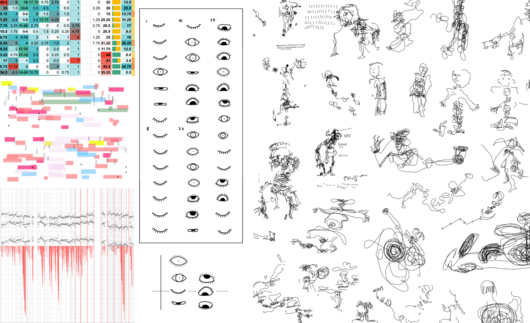4D — Body Data: Creative Visualization with p5.js, 9. SW Sommersemester 24
Kit KuksenokGK-Wahl, 4D . Prozess und Interaktion, Master 2. Stj., Master 1. Stj., Bachelor 4. Stj., Bachelor 3. Stj., Bachelor 2. Stj., Summer term 2024, 3. Kompaktwoche (9.SW),
This project-based course combines creative visualization using programming in p5.js, and an overview of topics relevant to body and health data, visual representations of body data, and the principles of data feminism.
There is a wealth of examples of how technology is used to observe the body. Body data can be collected through self-tracking, digital surveillance, journaling, and passively through wearable consumer and medical technologies. Visualization of body data plays an important part in how the bodies - both individually and collectively - are understood.
Course:
During the week, lecture segments and discussion provide many examples of motivations and possible impacts of body data visualization. We will apply methods from information visualization and human-computer interaction (HCI), and the principles of data feminism, to critique and construct visual representations of body data. We will consider examples from scientific, technical, and artistic contexts that mobilize, reconfigure, or re-appropriate self-tracking or surveillance tools.
On the basis of this, students will be asked to come up with a project. The focus will be on (1) representing body data in (2) a socially-situated context. This may mean finding and visualizing a dataset; prototyping a visualization of a hypothetical dataset; redesigning an existing visualization - or other possibilities.
No prior technical background is necessary; in-class examples provide an overview of how programming might be able to support expressive visualization. Examples in p5.js will be integrated throughout the week, alongside pen-and-paper sketching, data preparation in spreadsheets, and programmatic data visualization using Vega/Altair.
For the project, students are welcome to either use the p5.js examples as starting-points, or another method or process of their choice; ideas can be discussed on a case-by-case basis. If you’ve been curious how - and whether - programming might be used to support a creative data visualization practice, your questions and ideas are very welcome.
Each day in this week-long workshop will have the following focus:
- Monday - introductions: principles of data feminism and basics of body data
- Tuesday - visualization: combining abstract encoding and autographic visualization
- Wednesday - motivations behind visualization, data solidarity, and data activism
- Thursday - work on projects and get in-depth feedback from instructor
- Friday - presentations of projects, and peer discussion
The main course language in this Kompaktwoche will be English for lectures and discussions. Individual conversations about projects, as well as students project presentations, can use a mix of English and German.
Learning outcomes:
- Introduction to principles of data and information visualization
- Practice using principles of data feminism to help understand and construct visual representations or encodings of bodies and body data
- Experimenting with a wide range of data visualization concepts specific to body data
- Producing a group project that explores the societal and sociotechnical dimension of sharing body data by creating an interactive digital artifact or intervention
- Exploring the possibilities of using p5.js for creative data visualization
What to bring with you:
Laptop (and either Chrome or Firefox web browser) for p5.js work
Your preferred sketching media: tablet, pens and pencils, and/or sketchbook. For prototyping, any digital or analog media is welcome. Optional suggestion for analog sketching: color pens, markets, or pencils; matte translucent paper, such as vellum (Transparentpapier).
Bio:
Kit Kuksenok, PhD is a multi-disciplinary artist and researcher based in Berlin. Their research explores body knowledge practices: how is the unseen interior human body landscape rendered understandable? They hold a MSci (2014) and a PhD (2016) in Computer Science and Engineering from the University of Washington (Seattle). They have taught multiple courses at Berlin’s School of Machines, Making and Make-Believe, a non-profit Berlin-based organization that has offered courses open to the public on topics related to critical and creative engagement with technology and society. Kit’s research spans not only personal practices of self-tracking and creative information visualization, but also connects these practices to topics of digital surveillance and public health data. They have presented at the Weizenbaum conference on practicing digital sovereignty (2022) and at a working group on Data For Care at NeMe Arts Center (2023): www.neme.org/projects/toolkit-of-care/data-for-care Kit is currently chairing a track at the Politics of the Machines conference (Aachen 2024) on body imaginations, bringing together artists, designers, and scholars reflecting on how body representations and imaginations.
Course of study / Field of study
Design Fundamentals
Degree and academic year
Master 2. Stj.
Master 1. Stj.
Bachelor 4. Stj.
Bachelor 3. Stj.
Bachelor 2. Stj.
Term
Summer term 2024
Lecturer
Kit Kuksenok
Place
R110 Goldbau
Week type
3. Kompaktwoche (9.SW)
Times and dates
Informationen folgen nach Einschreibung
Maximum number of participants
20
Start and end of registration
20.03.2024 - 22.03.2024
Module name / Subject name
4D . Prozess und Interaktion
Design modules / Art offers
GK-Wahl
Type of examination
Teilnahme (T)
Grading
benotet
ECTS/LN
2
Course of study / Field of study
Design Fundamentals
Degree and academic year
Master 2. Stj.
Master 1. Stj.
Bachelor 4. Stj.
Bachelor 3. Stj.
Bachelor 2. Stj.
Term
Summer term 2024
Lecturer
Kit Kuksenok
Place
R110 Goldbau
Week type
3. Kompaktwoche (9.SW)
Times and dates
Informationen folgen nach Einschreibung
Maximum number of participants
20
Start and end of registration
20.03.2024 - 22.03.2024
Module name / Subject name
4D . Prozess und Interaktion
Design modules / Art offers
GK-Wahl
Type of examination
Teilnahme (T)
Grading
benotet
ECTS/LN
2

